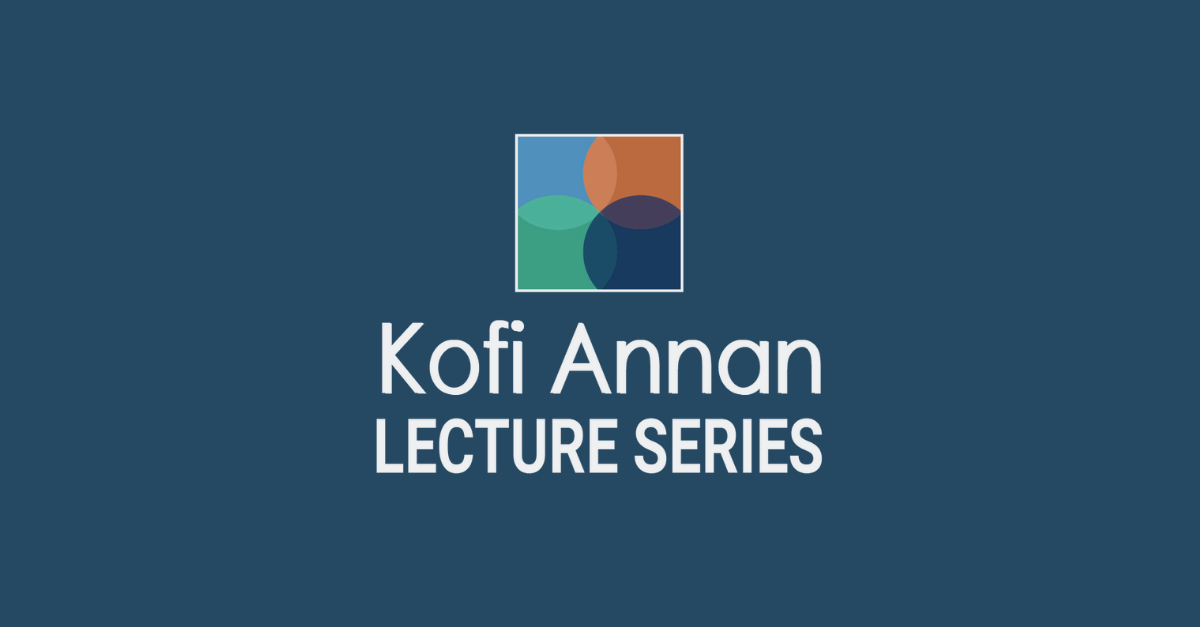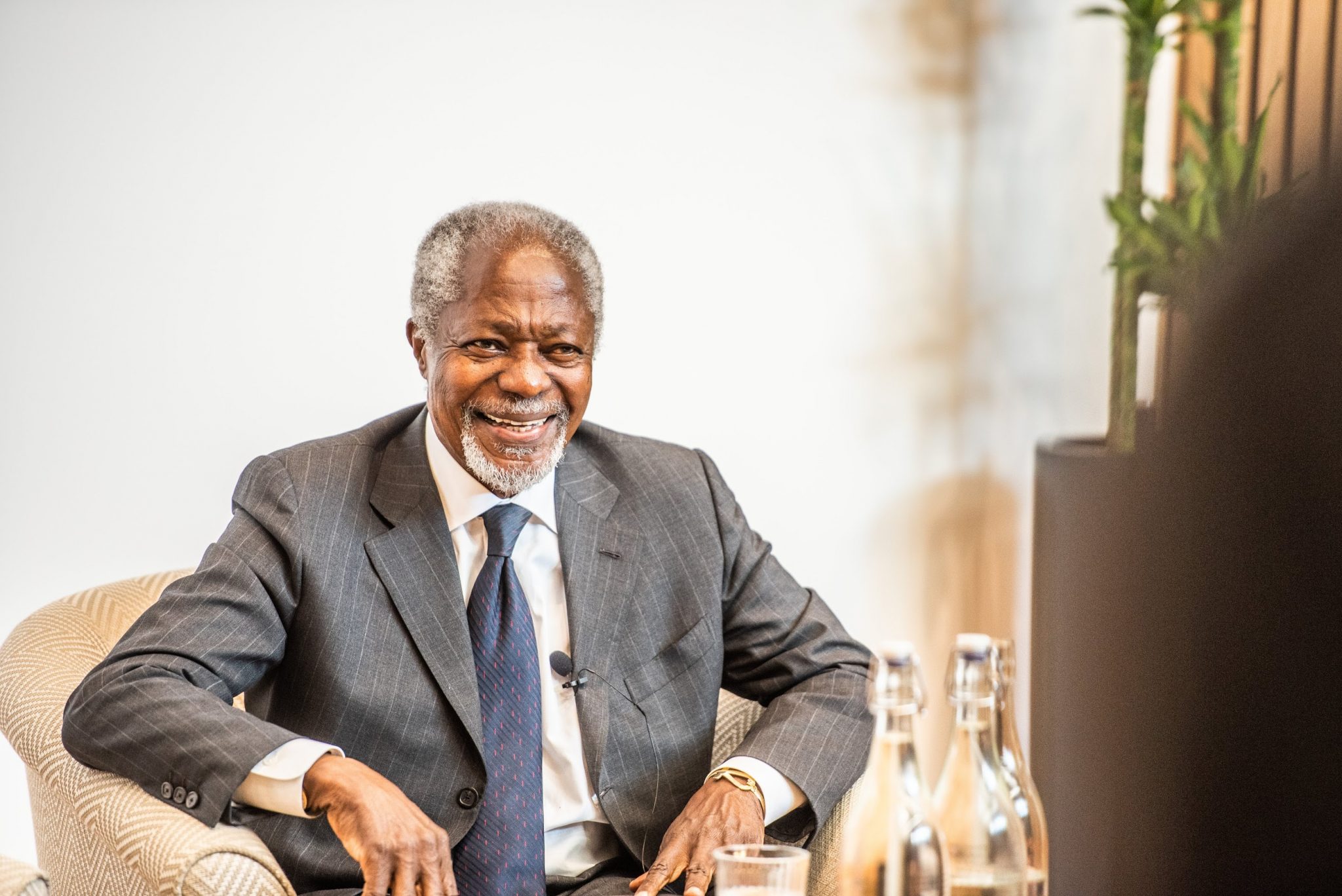Biography
Kofi Annan
Kofi A. Annan was the 7th Secretary-General of the United Nations and was the founder and chair of the Kofi Annan Foundation. In 2001, he and the United Nations were jointly awarded the Nobel Prize for Peace. Kofi Annan was praised for being “pre-eminent in bringing new life to the organization.” (Norwegian Nobel Committee, October 2001). He died in 2018 after a short illness.
Post-UN Life
Kofi Annan established the Kofi Annan Foundation as a catalyst for lasting peace and inclusive governance by anticipating looming threats security, development and human rights. With the Foundation, Annan then elaborated solutions and set in motion the political will to see these solutions implemented. In early 2008, he led the African Union’s Panel of Eminent African Personalities, which mediated a peaceful resolution to post-election violence in Kenya.
From February to August 2012, he was the UN–Arab League Joint Special Envoy for Syria, mandated to seek a resolution to the conflict there. Mr. Annan was the founding Chairman of the Alliance for a Green Revolution in Africa (AGRA), which works for a food secure and prosperous Africa by promoting rapid, sustainable agricultural growth based on smallholder farmers. AGRA’s programmes invest in soil regeneration and health, improved seeds, access to markets, and building capacity and investment throughout the agricultural value-chain. He chaired the African Progress Panel until the end of 2017, which advocated at the highest level for equitable and sustainable development in Africa. He was a member of The Elders, an independent group of global leaders who work together for peace and human rights, and in 2013 was appointed its Chair.
Kofi Annan was also Chancellor of the University of Ghana and held a number of positions at Universities around the world. He was a board member, patron or honorary member of a number of organisations, including the United Nations Foundation. A complete list can be found here. Kofi Annan’s widely acclaimed memoir: Interventions: A Life in War and Peace was published in 2012. Kofi Annan chaired the Global Commission on Elections, Democracy and Security (March 2011 to September 2012) and in January 2013, launched the West Africa Commission on Drugs, as a response to the surge in drug trafficking and consumption in West Africa and their impact on security, governance and public health.
From September 2016 to September 2017, Mr Annan chaired the Advisory Commission on Rakhine State. The Advisory Commission on Rakhine State was founded as a neutral and impartial body which aims to propose concrete measures for improving the welfare of all people in Rakhine state. It is was a joint venture of the Government of Myanmar and of the Kofi Annan Foundation.
In his last 2 years, under the helm of his Foundation, Kofi Annan launched projects to safeguard elections and democracy in the digital age, but also to promote youth leadership in the face of violent extremism, and to ensure that peace processes really produce lasting peace. Lastly, he advocated for agriculture that serves the poorest and emphatically warned against the dangers of climate change. With his Foundation, Kofi Annan supported countries facing difficult elections such as Nigeria, Mexico, Malaysia, Cameroun and Zimbabwe.
UN Secretary-General
Kofi Annan was UN Secretary General from January 1997 to December 2006. One of his main priorities during this period was a comprehensive programme of reform that sought to revitalize the United Nations and make the international system more effective. He was a constant advocate for human rights, the rule of law, the Millennium Development Goals and Africa, and sought to bring the organisation closer to the global public by forging ties with civil society, the private sector and other partners. At Mr. Annan’s initiative, UN peacekeeping was strengthened in ways that enabled the United Nations to cope with a rapid rise in the number of operations and personnel. It was also at Mr. Annan’s urging that, in 2005, Member States established two new intergovernmental bodies: the Peacebuilding Commission and the Human Rights Council.
Mr Annan likewise played a central role in the creation of the Global Fund to fight AIDS, Tuberculosis and Malaria, the adoption of the UN’s first-ever counter-terrorism strategy, and the acceptance by Member States of the “responsibility to protect” people from genocide, war crimes, ethnic cleansing and crimes against humanity. His “Global Compact” initiative, launched in 1999, has become the world’s largest effort to promote corporate social responsibility. Mr. Annan undertook wide-ranging diplomatic initiatives. In 1998, he helped to ease the transition to civilian rule in Nigeria. In the same year, he visited Iraq to resolve an impasse between Iraq and the Security Council over compliance with resolutions on weapons inspections and other matters; this effort helped to avoid an outbreak of hostilities which was imminent at that time.
In 1999, he was deeply involved in the diplomatic process that led to Timor-Leste’s independence from Indonesia. He was responsible for certifying Israel’s withdrawal from Lebanon in 2000, and in 2006 his efforts contributed to securing a cessation of hostilities between Israel and Hizbollah. Also in 2006, he mediated a settlement of the dispute between Cameroon and Nigeria over the Bakassi peninsula. Mr Annan’s efforts to strengthen the Organisation’s management, coherence and accountability involved major investments in training and technology, the introduction of a new whistle-blower policy and financial disclosure requirements, and steps to improve co-ordination at country level. Early career Kofi Annan joined the UN system in 1962 as an administrative and budget officer with the World Health Organization in Geneva.
He later served with the Economic Commission for Africa in Addis Ababa, the UN Emergency Force (UNEF II) in Ismailia, the United Nations High Commissioner for Refugees (UNHCR) in Geneva, and in various senior posts in New York dealing with human resources, budget, finance, and staff security. Immediately before becoming Secretary-General, he was Under-Secretary-General for Peacekeeping. Kofi Annan facilitated the repatriation from Iraq of more than 900 international staff and other non-Iraqi nationals (1990) and also served as Special Representative of the Secretary-General to the former Yugoslavia and Special Envoy to NATO (1995-1996).
Personal Life
Kofi Annan was born in Kumasi, Ghana, on 8 April 1938. He is married to Nane and between them they have three children and five grandchildren. He died on the 18th of August 2018 at the age of 80 in hospital in Bern, Switzerland, after a brief illness. He had been active in his Foundation’s work right up to his unexpected end.



